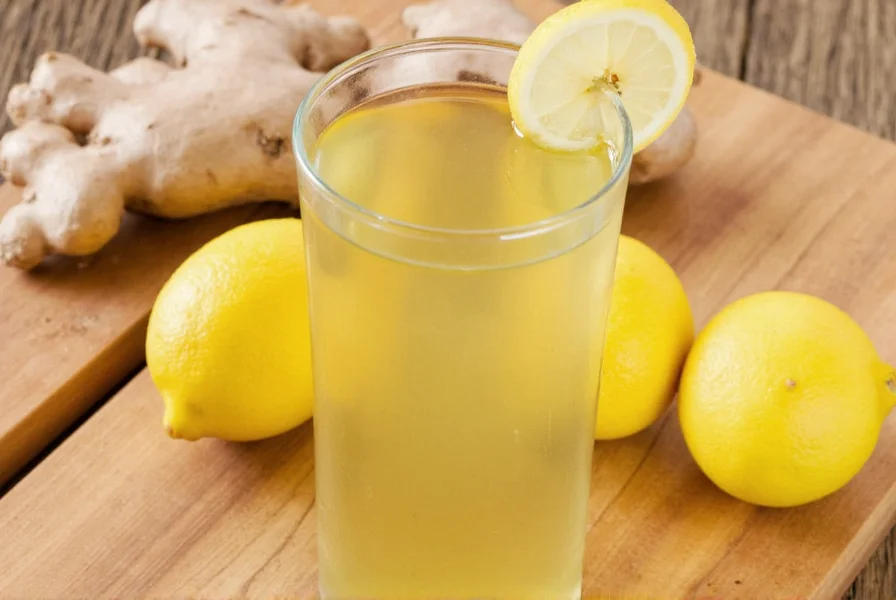Millions of people worldwide enjoy lemon ginger tea daily, drawn by its refreshing taste and purported health advantages. This simple beverage combines two powerful natural ingredients that have been used in traditional medicine for centuries. But what does modern science actually say about is lemon and ginger tea good for you? Let's examine the evidence behind this popular wellness drink.
Nutritional Composition of Lemon Ginger Tea
Lemon ginger tea isn't just a flavorful beverage—it delivers bioactive compounds with potential health impacts. Understanding what's in your cup helps clarify lemon ginger tea benefits for immune system and other effects.
| Component | Key Compounds | Primary Health Contributions |
|---|---|---|
| Ginger Root | Gingerols, Shogaols | Anti-inflammatory, digestive support, nausea relief |
| Lemon | Vitamin C, Flavonoids | Antioxidant protection, immune support |
| Tea Base (if used) | Catechins, L-theanine | Additional antioxidants, calm alertness |
Evidence-Supported Health Benefits
Digestive Health Improvements
One of the most well-documented lemon ginger tea benefits for digestion relates to gastrointestinal function. Ginger contains gingerols that accelerate gastric emptying and reduce intestinal spasms. A 2020 review in Nutrients confirmed ginger's effectiveness for:
- Reducing nausea (particularly morning sickness and chemotherapy-induced)
- Alleviating symptoms of functional dyspepsia
- Decreasing bloating and gas
Lemon's citric acid may further support digestion by stimulating bile production. Together, they create a synergistic effect that explains why many people reach for this tea after meals.
Anti-Inflammatory Properties
Chronic inflammation underlies many modern diseases. Research shows ginger's compounds inhibit inflammatory pathways similar to non-steroidal anti-inflammatory drugs (NSAIDs), but without the side effects. A 2019 study in Antioxidants demonstrated that regular ginger consumption reduced markers of inflammation by 20-30% in clinical trials.
When considering does lemon ginger tea help with inflammation, the evidence suggests moderate but meaningful effects, particularly for:
- Osteoarthritis pain management
- Post-exercise muscle soreness
- General inflammatory markers in the bloodstream
Immune System Support
While lemon ginger tea won't prevent infections, it provides compounds that support immune function. Vitamin C from lemon acts as an antioxidant protecting immune cells, while gingerols enhance white blood cell activity. During cold season, many people ask is lemon ginger tea good when sick—research indicates it may:
- Reduce duration of upper respiratory infections
- Alleviate sore throat discomfort
- Provide hydration crucial for recovery

Limitations and Common Misconceptions
Despite popular claims, lemon ginger tea has important limitations. Understanding what it doesn't do is crucial for realistic expectations about is lemon and ginger tea good for weight loss or other exaggerated benefits.
Weight Loss Claims
No credible evidence shows lemon ginger tea directly causes significant weight loss. Any effects are likely indirect through:
- Replacing high-calorie beverages
- Mild metabolic boost from ginger (approximately 5% increase)
- Reduced bloating that creates a slimmer appearance
Detoxification Myths
The liver and kidneys naturally detoxify the body. While lemon ginger tea supports hydration—which aids these organs—it doesn't "flush toxins" as some claim. The lemon ginger tea detox benefits are primarily about hydration and providing antioxidants that protect against oxidative stress.
Potential Side Effects and Considerations
For most people, lemon ginger tea is safe, but certain conditions warrant caution:
- Blood thinning medications: Ginger may enhance effects of drugs like warfarin
- Diabetes medications: Ginger can lower blood sugar, potentially causing hypoglycemia
- Gallstones: Lemon may stimulate gallbladder contractions
- Acid reflux: Citric acid could worsen symptoms in sensitive individuals
Pregnant women should limit ginger to 1 gram daily (about 1-inch fresh ginger). Those with bleeding disorders should consult doctors before regular consumption.
Optimal Preparation for Maximum Benefits
How you prepare lemon ginger tea affects its potency. For the best lemon ginger tea health benefits:
- Use fresh ginger root (1-inch piece per cup) grated or thinly sliced
- Steep in boiling water for 10-15 minutes (longer = stronger)
- Add lemon juice after tea cools slightly (below 60°C/140°F) to preserve vitamin C
- Consume 1-2 cups daily—more won't provide additional benefits

Conclusion: Is Lemon Ginger Tea Good for You?
The evidence confirms lemon ginger tea offers genuine health benefits, particularly for digestion, inflammation reduction, and immune support. While it's not a miracle cure, incorporating it into a balanced diet provides meaningful advantages with minimal risk for most people. The key is managing expectations—view it as a supportive element in overall wellness rather than a standalone solution. For those wondering is lemon and ginger tea good for daily consumption, moderate daily intake appears beneficial without significant drawbacks for healthy individuals.
Can lemon ginger tea help with weight loss?
Lemon ginger tea doesn't directly cause significant weight loss. Any effects are indirect through replacing high-calorie beverages, providing mild metabolic boost (about 5%), and reducing bloating. It should be part of a comprehensive weight management plan, not relied upon as a primary solution.
How much lemon ginger tea is safe to drink daily?
For most adults, 1-2 cups daily is considered safe and effective. Those using it for specific therapeutic purposes (like nausea relief) may temporarily increase to 3-4 cups, but long-term consumption above this amount could cause digestive discomfort or interact with certain medications.
Does lemon ginger tea really boost immunity?
Lemon ginger tea supports immune function through vitamin C (from lemon) and gingerols (from ginger) that enhance white blood cell activity. While it won't prevent infections, research shows it may reduce duration of upper respiratory infections and provide antioxidant protection for immune cells.
When should I avoid lemon ginger tea?
Avoid lemon ginger tea if you take blood thinners without consulting your doctor, have active gallstones, experience severe acid reflux, or have a bleeding disorder. Pregnant women should limit ginger to 1 gram daily. Those with low blood sugar should monitor levels when consuming regularly.
What's the best time to drink lemon ginger tea?
Morning consumption aids digestion throughout the day. Before meals helps prepare the digestive system. After meals reduces bloating. Before bed may help with relaxation but could cause nighttime bathroom visits due to hydration effects. Avoid on empty stomach if you have acid sensitivity.










 浙公网安备
33010002000092号
浙公网安备
33010002000092号 浙B2-20120091-4
浙B2-20120091-4